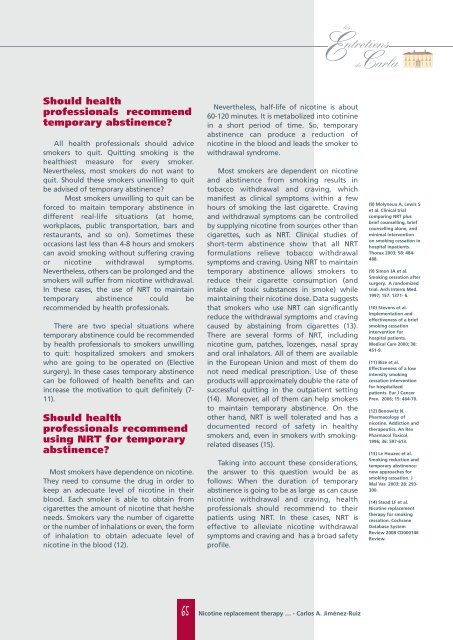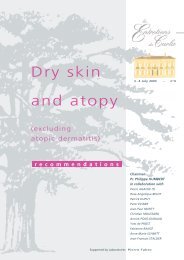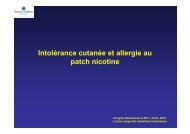Nicotine replacement therapy … - Carlos A ... - Entretiens du Carla
Nicotine replacement therapy … - Carlos A ... - Entretiens du Carla
Nicotine replacement therapy … - Carlos A ... - Entretiens du Carla
You also want an ePaper? Increase the reach of your titles
YUMPU automatically turns print PDFs into web optimized ePapers that Google loves.
Should health<br />
professionals recommend<br />
temporary abstinence?<br />
All health professionals should advice<br />
smokers to quit. Quitting smoking is the<br />
healthiest measure for every smoker.<br />
Nevertheless, most smokers do not want to<br />
quit. Should these smokers unwilling to quit<br />
be advised of temporary abstinence?<br />
Most smokers unwilling to quit can be<br />
forced to maitain temporary abstinence in<br />
different real-life situations (at home,<br />
workplaces, public transportation, bars and<br />
restaurants, and so on). Sometimes these<br />
occasions last less than 4-8 hours and smokers<br />
can avoid smoking without suffering craving<br />
or nicotine withdrawal symptoms.<br />
Nevertheless, others can be prolonged and the<br />
smokers will suffer from nicotine withdrawal.<br />
In these cases, the use of NRT to maintain<br />
temporary abstinence could be<br />
recommended by health professionals.<br />
There are two special situations where<br />
temporary abstinence could be recommended<br />
by health professionals to smokers unwilling<br />
to quit: hospitalized smokers and smokers<br />
who are going to be operated on (Elective<br />
surgery). In these cases temporary abstinence<br />
can be followed of health benefits and can<br />
increase the motivation to quit definitely (7-<br />
11).<br />
Should health<br />
professionals recommend<br />
using NRT for temporary<br />
abstinence?<br />
Most smokers have dependence on nicotine.<br />
They need to consume the drug in order to<br />
keep an adecuate level of nicotine in their<br />
blood. Each smoker is able to obtain from<br />
cigarettes the amount of nicotine that he/she<br />
needs. Smokers vary the number of cigarette<br />
or the number of inhalations or even, the form<br />
of inhalation to obtain adecuate level of<br />
nicotine in the blood (12).<br />
Nevertheless, half-life of nicotine is about<br />
60-120 minutes. It is metabolized into cotinine<br />
in a short period of time. So, temporary<br />
abstinence can pro<strong>du</strong>ce a re<strong>du</strong>ction of<br />
nicotine in the blood and leads the smoker to<br />
withdrawal syndrome.<br />
Most smokers are dependent on nicotine<br />
and abstinence from smoking results in<br />
tobacco withdrawal and craving, which<br />
manifest as clinical symptoms within a few<br />
hours of smoking the last cigarette. Craving<br />
and withdrawal symptoms can be controlled<br />
by supplying nicotine from sources other than<br />
cigarettes, such as NRT. Clinical studies of<br />
short-term abstinence show that all NRT<br />
formulations relieve tobacco withdrawal<br />
symptoms and craving. Using NRT to maintain<br />
temporary abstinence allows smokers to<br />
re<strong>du</strong>ce their cigarette consumption (and<br />
intake of toxic substances in smoke) while<br />
maintaining their nicotine dose. Data suggests<br />
that smokers who use NRT can significantly<br />
re<strong>du</strong>ce the withdrawal symptoms and craving<br />
caused by abstaining from cigarettes (13).<br />
There are several forms of NRT, including<br />
nicotine gum, patches, lozenges, nasal spray<br />
and oral inhalators. All of them are available<br />
in the European Union and most of them do<br />
not need medical prescription. Use of these<br />
pro<strong>du</strong>cts will approximately double the rate of<br />
successful quitting in the outpatient setting<br />
(14). Moreover, all of them can help smokers<br />
to maintain temporary abstinence. On the<br />
other hand, NRT is well tolerated and has a<br />
documented record of safety in healthy<br />
smokers and, even in smokers with smokingrelated<br />
diseases (15).<br />
Taking into account these considerations,<br />
the answer to this question would be as<br />
follows: When the <strong>du</strong>ration of temporary<br />
abstinence is going to be as large as can cause<br />
nicotine withdrawal and craving, health<br />
professionals should recommend to their<br />
patients using NRT. In these cases, NRT is<br />
effective to alleviate nicotine withdrawal<br />
symptoms and craving and has a broad safety<br />
profile.<br />
65 <strong>Nicotine</strong> <strong>replacement</strong> <strong>therapy</strong> … - <strong>Carlos</strong> A. Jiménez-Ruiz<br />
(8) Molyneux A, Lewis S<br />
et al. Clinical trial<br />
comparing NRT plus<br />
brief counselling, brief<br />
counselling alone, and<br />
minimal intervention<br />
on smoking cessation in<br />
hospital inpatients.<br />
Thorax 2003; 58: 484-<br />
488.<br />
(9) Simon JA et al.<br />
Smoking cessation after<br />
surgery. A randomized<br />
trial. Arch Interm Med.<br />
1997; 157: 1371- 6.<br />
(10) Stevens et al.<br />
Implementation and<br />
effectiveness of a brief<br />
smoking cessation<br />
intervention for<br />
hospital patients.<br />
Medical Care 2000; 38:<br />
451-9.<br />
(11) Bize et al.<br />
Effectiveness of a low<br />
intensity smoking<br />
cessation intervention<br />
for hospitalized<br />
patients. Eur J Cancer<br />
Prev. 2006; 15: 464-70.<br />
(12) Benowitz N.<br />
Pharmacology of<br />
nicotine. Addiction and<br />
therapeutics. An Rev<br />
Pharmacol Toxicol.<br />
1996; 36: 597-613.<br />
(13) Le Houzec et al.<br />
Smoking re<strong>du</strong>ction and<br />
temporary abstinence:<br />
new approaches for<br />
smoking cessation. J<br />
Mal Vas 2003; 28: 293-<br />
300.<br />
(14) Stead LF et al.<br />
<strong>Nicotine</strong> <strong>replacement</strong><br />
<strong>therapy</strong> for smoking<br />
cessation. Cochrane<br />
Database System<br />
Review 2008 CD000146<br />
Review.






